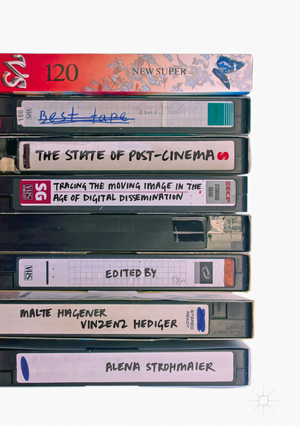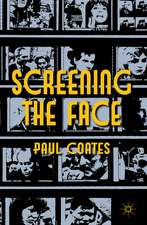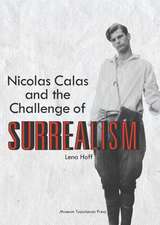The State of Post-Cinema: Tracing the Moving Image in the Age of Digital Dissemination
Editat de Malte Hagener, Vinzenz Hediger, Alena Strohmaieren Limba Engleză Hardback – 20 dec 2016
This book approaches the topic of the state of post-cinema from a new direction. The authors explore how film has left the cinema as a fixed site and institution and now appears ubiquitous - in the museum and on the street, on planes and cars and new digital communication platforms of various kinds. The authors investigate how film has become more than cinema, no longer a medium that is based on the photochemical recording and replay of movement. Most often, the state of post-cinema is conceptualized from the "high end" of the most advanced technology; discussions focus on performance capture and digital 3-D, 4-K projection and industrial light & magic. Here, the authors' approach is focused on the "low-end" circulation of filmic images. This includes informal networks of exchange and transaction, such as p2p-networks, video platforms and so called “piracy” with a special focus on the Middle East and North Africa, where political and social transformations makenew forms of circulation and presentation particularly visible.
Preț: 753.53 lei
Preț vechi: 941.91 lei
-20% Nou
Puncte Express: 1130
Preț estimativ în valută:
144.19€ • 150.85$ • 119.78£
144.19€ • 150.85$ • 119.78£
Carte disponibilă
Livrare economică 12-26 martie
Livrare express 26 februarie-04 martie pentru 33.31 lei
Preluare comenzi: 021 569.72.76
Specificații
ISBN-13: 9781137529381
ISBN-10: 1137529385
Pagini: 240
Ilustrații: XVII, 233 p. 15 illus. in color.
Dimensiuni: 148 x 210 x 20 mm
Greutate: 0.54 kg
Ediția:1st ed. 2016
Editura: Palgrave Macmillan UK
Colecția Palgrave Macmillan
Locul publicării:London, United Kingdom
ISBN-10: 1137529385
Pagini: 240
Ilustrații: XVII, 233 p. 15 illus. in color.
Dimensiuni: 148 x 210 x 20 mm
Greutate: 0.54 kg
Ediția:1st ed. 2016
Editura: Palgrave Macmillan UK
Colecția Palgrave Macmillan
Locul publicării:London, United Kingdom
Cuprins
Acknowledgments.- Introduction.- Like Water: On the Reconfigurations of the Cinema in the Age of Digital Networks (Malte Hagener, Vinzenz Hediger, Alena Strohmaier).- I. Informal Economies: Promises and Threats of Dissemination Technologies.- Venice to Go: Digital Circulation and the Value of Cultural In/difference in Film (Vinzenz Hediger).- Arab Storytelling in the Digital Age: From Musalsalat to Web Drama? (Alexandra Buccianti).- Mapping the Circulation of Films by Women Filmmakers with Maghrebi Funding (Patricia Caillé).- II. Informal Networks: National-Regional-Global Nexus.- The Good Pirates: Moroccan Cinema in the Age of Digital Reproduction (Jamal Bahmad).- Watching the Forbidden: Reception of Banned Films in Iran (Zeydabadi-Nejad).- Why Sories Matter: Jafar Panahi and the Contours of Cinema (Alena Strohmaier).- Informal Translation, Post-Cinema and Global Media Flows (Tessa Dwyer and Ramon Lobato).- III. Informal Aesthetics: Reshaping Cine-Cultures.- Post-Cinematic Distribution Flows. Alternative Content, Sports Films and the (In)stability of the Multiplex Market (Florian Hoof).- Distributing Moving Image Art After Digitization (Erika Balsom).- Cinephilia and Film Culture in the Age of Digital Networks (Malte Hagener).- The Secret Lives of Images (Marc Siegel).- Interview with Kevin B. Lee.- Index
Notă biografică
Malte Hagener is professor for film at Philipps-Universität Marburg. Recent publications include Moving Forward, Looking Back: The European Avant-garde and the Invention of Film Culture (2007), Film Theory: An Introduction through the Senses(2010, with T. Elseasser) and The Emergence of Film Culture (2014, as editor).
Vinzenz Hediger is a professor of cinema studies at Gothe Universität Frankfurt. He is the founding editor of the Zeitschrift für Medienwissenschaft and one of the co-founders of the European Network of Cinema Studies (NECS).
Alena Strohmaieris a Research Fellow in the BMBF research network "Re-Configurations". She is currently a member of the NECS Steering Committee and in the editorial team of META Journal.
Textul de pe ultima copertă
This book approaches the topic of the state of post-cinema from a new direction. The authors explore how film has left the cinema as a fixed site and institution and now appears ubiquitous - in the museum and on the street, on planes and cars and new digital communication platforms of various kinds. The authors investigate how film has become more than cinema, no longer a medium that is based on the photochemical recording and replay of movement. Most often, the state of post-cinema is conceptualized from the "high end" of the most advanced technology; discussions usually focus on performance capture and digital 3-D, 4-K projection and industrial light & magic. Here, the authors' approach is focused on the "low-end" of the circulation of filmic images. This includes informal networks of exchange and transaction, such as p2p-networks, video platforms, so called “piracy” with a special focus on the Middle East and North Africa, where political and social transformations make new forms of circulation and presentation particularly visible.
Caracteristici
Addresses circulations of the moving image in the global experimental cinema underground Raises important questions surrounding the economic and legal aspects of image circulation in an age of digital dissemination Questions the suitability of cinema copyright enforcement anchored in local legal traditions of Western industrialized nations














